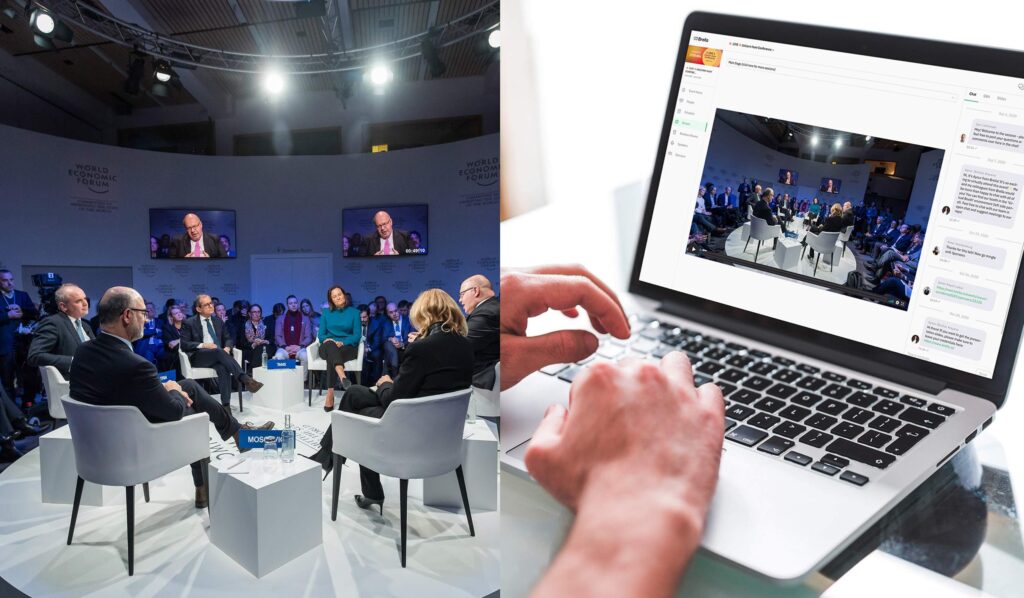In-Person, Virtual or Hybrid – Which Will You Choose?
The face of events has been changing over the past few years and different options have emerged. The choice between in-person, virtual, or hybrid events depends on various factors and considerations. There is no one-size-fits-all answer, as the best option can vary based on the nature of the event, the goals you want to achieve, the target audience, and the resources available. Let’s explore the advantages and considerations for each type:
In-Person Events:
-
- Advantages: In-person events offer direct human interaction, networking opportunities, and a sense of community that can be difficult to replicate virtually. They also provide a chance to engage the senses and create memorable experiences.
- Considerations: In-person events can be more expensive to organise due to venue costs, travel expenses, and logistical arrangements. They might also have limited reach since attendees need to be physically present.

Virtual Events:
-
- Advantages: Virtual events are often more cost-effective, have a potentially larger global reach, and can be more accessible to a wider audience. They are also more flexible in terms of scheduling and attendance.
- Considerations: Virtual events might lack the personal touch and spontaneous interactions that in-person events offer. Attendees might experience “Zoom fatigue” from spending prolonged periods in front of screens.

Hybrid Events:
-
- Advantages: Hybrid events combine the benefits of both in-person and virtual formats. They allow for broader audience engagement while still offering some level of face-to-face interaction. Attendees can choose the format that suits them best.
- Considerations: Hybrid events can be complex to plan and execute, requiring a seamless integration of both in-person and virtual components. Ensuring a consistent experience for both types of attendees is a challenge.

To determine which format is best for your event, consider the following factors:
- Event Goals: What are you trying to achieve with the event? Is it networking, education, sales, brand exposure, or something else? Different formats can better align with specific goals.
- Target Audience: Who are your attendees? Consider their preferences, locations, and accessibility. Some audiences might prefer in-person interactions, while others might appreciate the convenience of virtual options.
- Budget: Assess your budget constraints. In-person events can be more expensive due to venue, catering, and travel costs.
- Technology and Resources: Virtual and hybrid events rely heavily on technology. Ensure you have the necessary tools and expertise to provide a seamless experience.
- Engagement and Interaction: Consider the level of engagement and interaction required for your event. Virtual events might require creative ways to foster engagement without in-person interaction.
- Logistics: Consider the practical aspects of organising each type of event, including travel restrictions, safety protocols, and technical requirements.
Ultimately, the “best” option depends on finding the right balance between your event goals, audience preferences, and available resources. It’s also worth staying updated on industry trends and innovations to make informed decisions.
Related Posts

A Corporate Christmas Party with a Difference
Do you dread the company’s Christmas party invitation arriving on your desk? Tired of soggy sausage rolls, lukewarm turkey, and limp vegetables, coupled with making small talk over a glass…

Electric Flamingo Christmas Party
In the dark days of winter, London becomes a canvas of sparkling lights, festive decorations, and joyous celebrations. Among the myriad of events, the Electric Flamingo Christmas Party at The…

Le Sorelle Barge in London
Discover an unparalleled blend of historical charm, luxury, and modern comfort aboard Le Sorelle, an extraordinary 1950s barge conversion nestled in the heart of Canary Wharf. Crafted with reclaimed wood…

Finding the Perfect Gallery Venue in London
Finding the perfect gallery venue for an event offers an inspiring environment that can greatly enhance the creative experience. These spaces are specifically designed to showcase artistic work, providing optimal…
